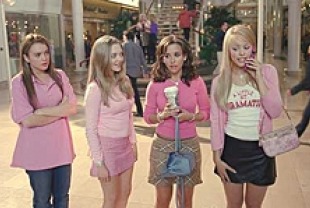Fifteen year-old Cady Heron (Lindsay Lohan) is the ultimate outsider. Raised and home schooled in the African bush by her zoologist parents, she is an independent thinker and a very smart math student. But things don't add up when she enters North Shore High School in a small town outside of Chicago. The place is divided into so many cliques that she can't even decipher them all.
Luckily, Cady is taken in by Janis (Lizzy Caplan) and Damian (Daniel Franzese), who are self-described outsiders. She's an angry punk, and he's "almost too gay to function." They give her the scoop on the cliques, saving most of their venom for "The Plastics," a trio of Barbie doll look-alikes led by Regina (Rachel McAdams), who thinks she is above everyone else. Her two dim-witted handmaidens are Gretchen (Lacey Chabert) and Karen (Amanda Seyfried). When they ask Cady to join their elite circle, she agrees to do, but only after secretly agreeing to be a spy for Janis and Damian. The animosities and gossip mongering begins in earnest when the newcomer gets a crush on Aaron (Jonathan Bennett), a handsome hunk in her calculus class. He was Regina's boyfriend until she ditched him, and now she's having second thoughts.
This spiffy morality play has plenty of dramatic fireworks which are nicely orchestrated by director Mark Walters (Freaky Friday). The better-than-average screenplay by Tina Fey, a head writer on Saturday Night Live and co-anchor of the show's popular "Weekend Update" segment, is based on Rosalind Wiseman's best seller Queen Bees and Wannabes: Helping Your Daughter Survive Cliques, Gossip, Boyfriends and Other Realities of Adolescence. The film succeeds, in large part, because Lindsay Lohan is such a credible character as Cady, who just for trying to fit in finds herself on the slippery slope of social climbing, gossip, lying, and betrayal. Pandemonium breaks out in the school when a "burn book" full of nasty comments on most of the girls surfaces. Ms. Norbury (Tina Fey), Cady's math teacher, says: "Calling somebody else fat will not make you any thinner. Calling somebody stupid will not make you any smarter. And you've got to stop calling each other sluts and whores. It just makes it all right for the guys to call you that." Although this may strike some as too preachy, the film drives home the point that being cruel is no way to build up one's self-esteem. You become just as much a victim as the people on the other end of your mean and degrading behavior.
The spiritual dimensions of right speech, a theme in Buddhism, are at the heart and soul of this comedy. It's a universal concern — and not just for the young. We were reminded of this story told by Sylvia Boorstein in her book It's Easier Than You Think.
"I think a lot about the fact that the Buddha made a separate category for Right Speech. He could have been more efficient and included it in Right Action, since speaking is a form of action. For a while I thought it was separate because we speak so much. But then I changed my mind — some people don't speak a lot. Now, I think it's a separate category because speech is so potent.
"I read a sentence in a magazine years ago, a page filler added to the bottom of a column because the article wasn't quite long enough. I don't recall what magazine it was or what the article was about, but I remember the sentence. It said, 'Sticks and stones may break my bones, but words can always harm me.'
"Sometimes, in a class, I will say, 'Raise your hand if you have ever broken a bone.' After people raise their hands, I say, 'Leave your hand up if that bone still hurts you now.' Usually, all the hands come down. Then I say, 'Raise your hand if you still feel pain from something someone said to you in the past year.' Lots of hands go up. 'Keep your hand up if you have pain from a remark someone made about you in the last five years.' Hands stay up. 'Last ten years . . . twenty years . . . thirty years . . . a remark made before you were five years old.' Many people still have an arm in the air. They look around at each other and smile, sheepishly, but I don't think anyone is amused. It is a lovely moment of shared compassion, of being a witness to the burden we have all borne of carrying the pain of hurtful remarks. Perhaps we think that if we are mature adults we should have gotten over the rebukes of childhood. I wonder if we ever do. I think we are all quite vulnerable, like cream puffs, crisp on the outside but fragile inside and very sweet."
The DVD includes three featurettes, "Only the Strong Survive," "Plastic Fashion," and "The Politics of Girl World"; the latter, with comments from Rosalind Wiseman, author of Queen Bees and Wannabes, is the most interesting. The audio commentary is by director Mark Waters, screenplay writer and actress Tina Fey, and producer Lorne Michales. The trailer, a blooper reel, and deleted scenes round out the package.
